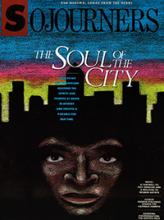THE CITY [in Hebrew] is 'iyr or 'iyr re'em. Now this word has several meanings. It is not only the city, but also the Watching Angel, the Vengeance and the Terror ... We must admit that the city is not just a collection of houses with ramparts, but also a spiritual power. I am not saying it is a being. But like an angel it is a power, and what seems prodigious is that its power is on a spiritual plane.
-- The Meaning of the City, by Jacques Ellul
IN THE HOT SUMMER OF 1988 SOMETHING happened in Detroit. A well-financed campaign to legalize and develop casino gambling as the panacea for the city's desperate, ongoing economic crisis was rejected overwhelmingly at the polls. It was one in a series of rebuffs for Mayor Coleman Young's administration.
Oh, yes, there was a hard-working, no-budget countercampaign by neighborhood organizations, and a stiffening in city pulpits -- even in some normally sympatico with the mayor's agenda. But perhaps something more was at work ...
One neighborhood activist who served a token appointment on the mayor's blue-ribbon committee studying the issue offered a minority report of solid arguments and reasons, then groped further, to the brink of something more: "I don't know, I'm not sure how to say this. Detroit is a blue-collar town. Its essential character is just a bad fit for casinos, with their big money and glitz. From an image perspective, it just doesn't work."
What if the city of Detroit, its spirit and identity, was an ally, most unacknowledged, in the fight against the casino invasion? That would be a political (and theological) insight worth pursuing.
Read the Full Article

